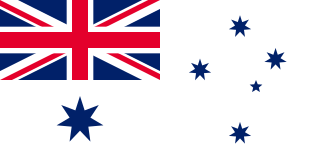| Chief of Defence Intelligence | |
|---|---|
| Department of Defence | |
| Style | Vice Admiral Lieutenant General Air Marshal |
| Abbreviation | CDI |
| Member of | Australian Defence Force |
| Reports to | Chief of the Defence Force |
| Formation | 1 July 2020 |
| First holder | Lieutenant General Gavan Reynolds |
| Website | Official website |
The Chief of Defence Intelligence (CDI) is a three-star role within the Australian Defence Force (ADF), responsible for the Defence Intelligence Group. The Minister of Defence, Linda Reynolds announced the creation of the new Defence Intelligence Group under the command of the CDI which brought the Defence Intelligence Organisation (DIO), Australian Geospatial-Intelligence Organisation (AGO) and some other elements together under a single command. [1] [2]
The following list chronologically records those who have held the post of CDI, with rank and honours as at the completion of the individual's term.
| Rank | Name | Postnominals | Term began | Term ended |
|---|---|---|---|---|
| Lieutenant General | Gavan Reynolds | AO | 1 July 2020 | Incumbent |

The Tatmadaw is the military of Myanmar. It is administered by the Ministry of Defence and composed of the Myanmar Army, the Myanmar Navy and the Myanmar Air Force. Auxiliary services include the Myanmar Police Force, the Border Guard Forces, the Myanmar Coast Guard, and the People's Militia Units. Since independence in 1948, the Tatmadaw has faced significant ethnic insurgencies, especially in Chin, Kachin, Kayin, Kayah, and Shan states. General Ne Win took control of the country in a 1962 coup d'état, attempting to build an autarkic society called the Burmese Way to Socialism. Following the violent repression of nationwide protests in 1988, the military agreed to free elections in 1990, but ignored the resulting victory of the National League for Democracy and imprisoned its leader Aung San Suu Kyi. The 1990s also saw the escalation of the conflict between Buddhists and Rohingya Muslims in Rakhine State due to RSO attacks on Tatmadaw forces.

The Royal Australian Navy (RAN) is the naval force of the Australian Defence Force (ADF). The professional head of the RAN is Chief of Navy (CN) Vice Admiral Mark Hammond AM, RAN. CN is also jointly responsible to the Minister of Defence (MINDEF) and the Chief of Defence Force (CDF). The Department of Defence as part of the Australian Public Service administers the ADF.

The Australian Signals Directorate (ASD), formerly the Defence Signals Directorate (DSD) is the federal statutory agency in the Australian Government responsible for foreign signals intelligence, support to military operations, cyber warfare, and information security. ASD is part of the Australian Intelligence Community. ASD's role within UKUSA Agreement is to monitor signals intelligence ("SIGINT") in South and East Asia. The ASD also houses the Australian Cyber Security Centre.

The Australian Defence Force (ADF) is the military organisation responsible for the defence of the Commonwealth of Australia and its national interests. It has three branches: the Royal Australian Navy (RAN), Australian Army and the Royal Australian Air Force (RAAF). The ADF has a strength of just over 90,000 personnel and is supported by the Department of Defence and several other civilian agencies.

The Ministry of Defence is the department responsible for implementing the defence policy set by His Majesty's Government, and is the headquarters of the British Armed Forces.

Defence Intelligence (DI) is an organisation within the United Kingdom intelligence community which focuses on gathering and analysing military intelligence. It differs from the UK's intelligence agencies in that it is an integral part of a government department – the Ministry of Defence (MoD) – rather than a stand-alone organisation. The organisation employs a mixture of civilian and military staff and is funded within the UK's defence budget. The organisation was formerly known as the Defence Intelligence Staff (DIS), but changed its name in 2009.

The United Kingdom's Strategic Command (StratCom), previously known as Joint Forces Command (JFC), manages allocated joint capabilities from the three armed services.
The Australian Geospatial-Intelligence Organisation (AGO) is an Australian government intelligence agency that is part of the Department of Defence responsible for the collection, analysis, and distribution of geospatial intelligence (GEOINT) in support of Australia's defence and national interests. The AGO is one of six agencies that form the Australian Intelligence Community.
The Australian Intelligence Community (AIC) and the National Intelligence Community (NIC) or National Security Community of the Australian Government are the collectives of statutory intelligence agencies, policy departments, and other government agencies concerned with protecting and advancing the national security and national interests of the Commonwealth of Australia. The intelligence and security agencies of the Australian Government have evolved since the Second World War and the Cold War and saw transformation and expansion during the Global War on Terrorism with military deployments in Afghanistan, Iraq and against ISIS in Syria. Key international and national security issues for the Australian Intelligence Community include terrorism and violent extremism, cybersecurity, transnational crime, the rise of China, and Pacific regional security.
Air Chief Marshal Sir Joseph Charles French,, often known as Sir Joe French, is a retired senior Royal Air Force officer who was the last Air Officer Commanding-in-Chief RAF Strike Command (2006–07).
The Capability Acquisition and Sustainment Group (CASG) is an organisation within the Australian Department of Defence, responsible for acquisition, supply chain management, and sustainment of military equipment and materiel including aircraft, ships, vehicles, electronic systems, weapons, ordnance, uniforms and rations for the Australian Defence Force. CASG employs more than 7000 military, civilian and contracted staff in more than 70 locations around Australia and internationally.
Defence Australia is a department of the Government of Australia charged with the responsibility to defend Australia and its national interests. Along with the Australian Defence Force (ADF), it forms part of the Australian Defence Organisation (ADO) and is accountable to the Commonwealth Parliament, on behalf of the Australian people, for the efficiency and effectiveness with which it carries out the Government's defence policy.
The Australian Defence Organisation (ADO), also known as simply Defence, is an Australian Government organisation that consists of both the Australian Defence Force (ADF) and the Department of Defence (DoD). The ADO's collective aims are to "defend Australia and its national interests" and "protect and advance Australia's strategic interests".
The Australian Defence Organisation (ADO) is composed of the armed forces of the Commonwealth of Australia, the Australian Defence Force (ADF), and the Australian Public Service government department, the Department of Defence which is composed of a range of civilian support organisations.
The Australian Defence Organisation (ADO) is composed of the armed forces of the Commonwealth of Australia, the Australian Defence Force (ADF), and the Australian Public Service government department, the Department of Defence which is composed of a range of civilian support organisations.
The Chief of Defence Intelligence (CDI); French: Chef du Renseignement de la Défense, (CRD) was a Canadian intelligence agency, part of a broader Canadian security and intelligence community that comprises several departments and agencies that collect and analyze intelligence on issues of concern to Canada and also manages DND/CF national/international intelligence partnerships.

The National Security Committee (NSC), also known as National Security Committee of Cabinet, is the peak decision-making body for national security and major foreign policy matters in the Australian Government. It is a committee of the Cabinet of Australia, though decisions of the NSC do not require the endorsement of the Cabinet itself.
Lieutenant General Gavan John Reynolds, is a senior officer in the Australian Army. He joined the army via the Royal Military College, Duntroon in 1985 and has spent much of his career in military intelligence. He has commanded the 1st Intelligence Battalion (2004–05) and the 6th Combat Support Brigade (2013–15), and deployed on operations to the Persian Gulf, Lebanon and Syria, Iraq, and Afghanistan. He served as Head Military Strategic Plans from 2019 to 2020, before being appointed as the inaugural Chief of Defence Intelligence in July 2020.

The Digital and Intelligence Service (DIS) is the digital service branch of the Singapore Armed Forces (SAF) responsible for providing military intelligence to the armed forces, building up the country's digital defence capabilities, and protecting the psychological defence of its military personnel. It was established on 28 October 2022, in response to the increased number of attacks by non-state actors, and the resulting damage from the Russian–Ukrainian cyberwarfare.